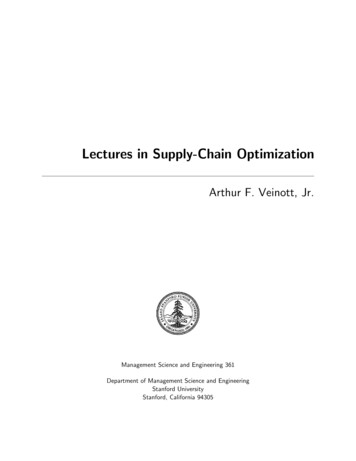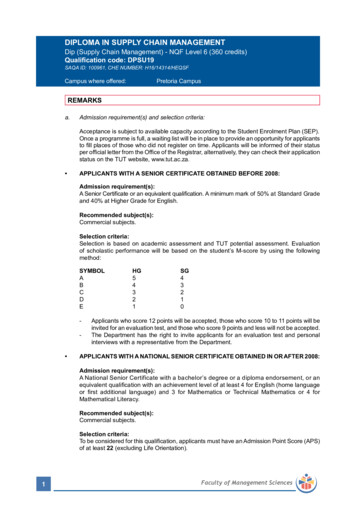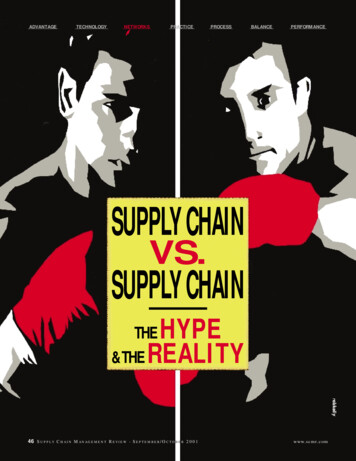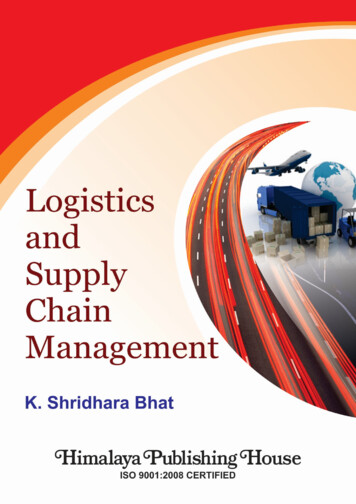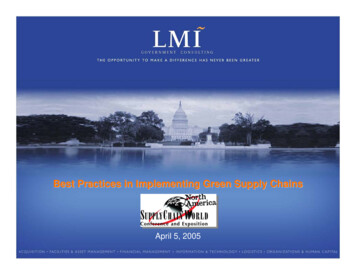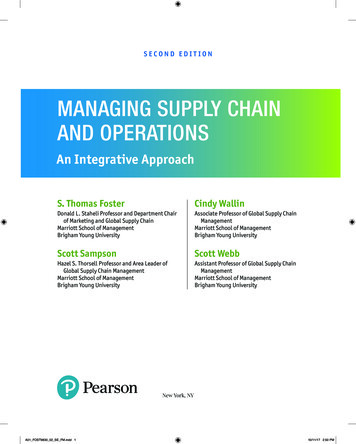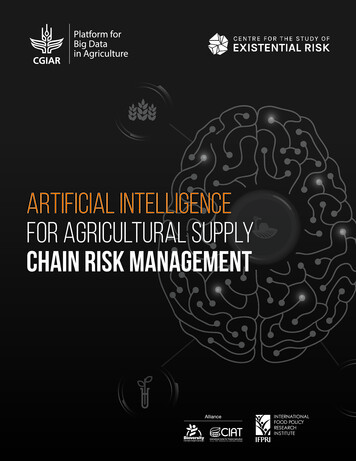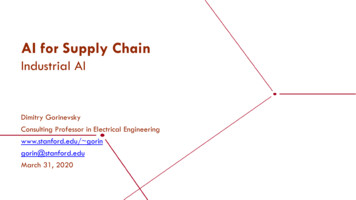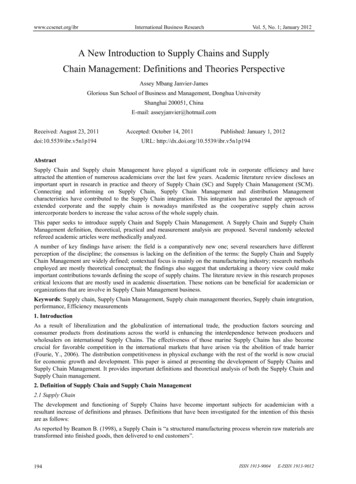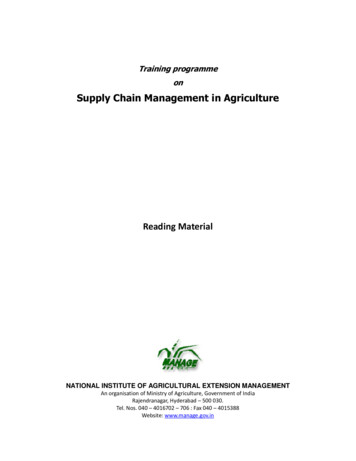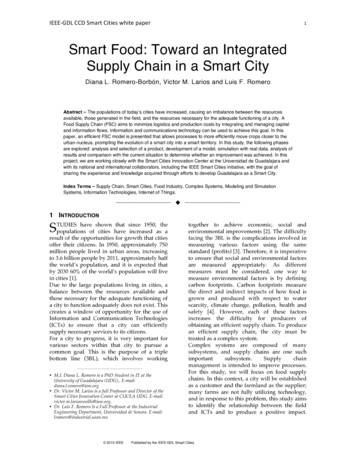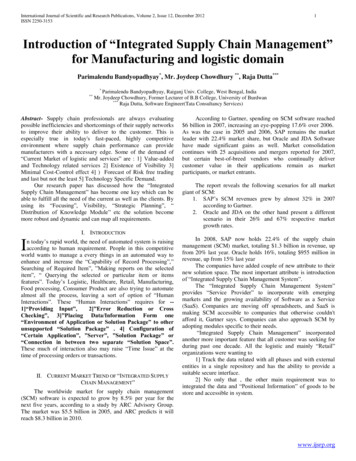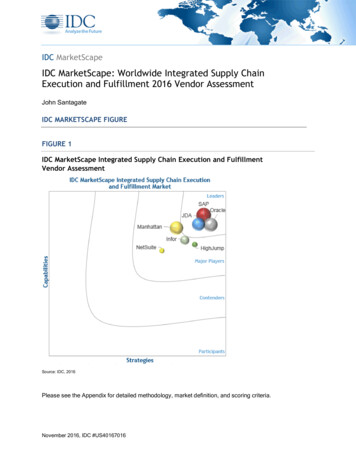
Transcription
IDC MarketScapeIDC MarketScape: Worldwide Integrated Supply ChainExecution and Fulfillment 2016 Vendor AssessmentJohn SantagateIDC MARKETSCAPE FIGUREFIGURE 1IDC MarketScape Integrated Supply Chain Execution and FulfillmentVendor AssessmentSource: IDC, 2016Please see the Appendix for detailed methodology, market definition, and scoring criteria.November 2016, IDC #US40167016
IDC OPINIONThis IDC study represents the vendor assessment model called IDC MarketScape. This research is aquantitative and qualitative assessment of the characteristics that explain a vendor's success in theintegrated supply chain execution and fulfillment marketplace and help assess current and anticipatedperformance in the marketplace. This study assesses the capability and business strategy of sevenkey vendors with a robust suite of supply chain execution and fulfillment applications and the capabilityto provide an integrated approach to supply chain execution and fulfillment. This evaluation is basedon a comprehensive framework and set of parameters expected to be most conducive to success inproviding an integrated approach to supply chain execution in both the short term and the long term.IDC Manufacturing Insights defines integrated supply chain execution and fulfillment as an approach tomanaging the flow of action and information throughout the fulfillment process that delivers processoptimization with integration between warehouse management (WMS), transportation management(TMS), and order management/fulfillment. The criteria used in the IDC MarketScape for integratedsupply chain execution and fulfillment (and the resulting positions in Figure 1) are across dualdimensions of strategy (future plans and where the vendor is headed) and capability (where the vendoris today in terms of capabilities). Each of the elements within strategy and capability is then assigned aweighting based on the relative importance of each criterion in the opinion of IDC ManufacturingInsights and feedback from manufacturing and retail users. This IDC MarketScape is a starting pointfor manufacturers and retailers that are considering an integrated approach to supply chain executionand fulfillment. The vendors included represent a "short list" — a way to winnow down the long list ofapplication providers, both big and small, that exist in the marketplace. It does not replace the duediligence that companies must then do to evaluate which vendor is the right fit for their particular needsand circumstances. Key findings include: Each vendor included in this IDC MarketScape (HighJump, Infor, JDA, Manhattan Associates,NetSuite, Oracle, and SAP) either offers all application areas or has shown the capability tointegrate with other application vendors to deliver an integrated approach to supply chainexecution and fulfillment. Of the seven vendors included in this study, Infor, NetSuite, Oracle, and SAP provide supplychain execution capabilities within a much broader set of tools, with a foundation in enterpriseresource planning (ERP). Of the seven vendors included in this study, HighJump, JDA, and Manhattan focus exclusivelyon delivering supply chain management applications and functionality, albeit across thebroader spectrum of supply chain management requirements.IDC MARKETSCAPE VENDOR INCLUSION CRITERIAIntegrated supply chain execution and fulfillment is the notion that all supply chain executionprocesses and technology are aligned to provide optimal supply chain execution performance andenable "fast fulfillment." Essentially, a truly integrated supply chain execution and fulfillment strategy iswhere all supply chain execution processes and systems are designed to operate as a seamless entityto deliver the best possible fulfillment experience to customers without sacrificing accuracy or quality.While this type of approach has been long sought after, defining and executing to an integratedapproach has largely been elusive. As application vendors have continued to develop applications withstrong integration capabilities, achieving an integrated approach to supply chain execution andfulfillment is increasingly becoming a reality in today's marketplace. 2016 IDC#US401670162
There exists an abundance of supply chain execution application vendors with capabilities specific torequirements across the spectrum of supply chain execution. The intent with this IDC MarketScape isto focus on those notable vendors with a robust suite of offerings, covering multiple supply chainexecution functional areas, and with the capability to integrate the applications across functional areas.Each of the seven vendors evaluated meets these requirements.ESSENTIAL BUYER GUIDANCEIntegrated supply chain execution and fulfillment requires an organization to take a holistic approach tomanaging supply chain execution and fulfillment. Creating alignment across systems and businessprocesses can play a significant role in helping manufacturers create visibility across the supply chain,deliver an exceptional customer experience, and create value for the firm. In other words, deliver "fastfulfillment." Today, it simply is not enough to have best-in-class functionality in a specific area and yetlack integration across the business process and systems. An organization with an integratedapproach to supply chain execution and fulfillment may indeed exceed the performance of a firm thathas best-in-class functionality in certain areas while lacking the integration layer. For companieslooking to create an integrated approach to supply chain execution and fulfillment and evaluatingvendors that are capable of supporting such an approach, we offer the following guidance: Look at your supply chain holistically. Take an end-to-end view of your supply chain tounderstand the flow of materials and data. Look for redundancy and excessive customizationsthat stand in the way of establishing an integrated approach to supply chain execution. Define a future state strategy. Take the time to map out and plan what an optimized supplychain execution strategy will look like (see IDC MaturityScape: Integrated Supply ChainExecution 1.0, IDC #US40152216, June 2016). Identify variance between the current stateand optimized state and define a road map for progressing from the current state to a futurestate. Keep in mind that these efforts often take long periods of time to complete as doingthings with a big bang can be disruptive to operations. Identify early wins that will show thevalue and prioritize projects that will rapidly deliver a return. Define business process requirements. During the process of understanding the current stateand planning a future state, be sure to capture business requirements relative to supply chainexecution. This is especially important relative to selecting application vendors. Vendor selectionshould include alignment between business process requirements and application capabilities. Ensure alignment between line of business (LOB) and IT. Throughout the process ofevaluating, mapping, and planning, it is critical to have key stakeholders from both the LOBand IT. Such collaboration is done to ensure that both the business requirements are met andthat IT can support, maintain, and deliver a technology architecture that meets the needs ofthe business. Keep customization to a minimum. Customized workflows and systems add a layer ofcomplexity into the supply chain that impacts the ability to truly create an integrated approachto supply chain execution. It is important to keep a standardized approach, as much aspossible, in order to enable processes and applications that interact seamlessly across theorganization. Work with application vendors that meet your needs. During the process of vendor selectionfor supply chain execution applications, seek out vendors that both meet the needs of yourbusiness today and have a future strategy that aligns well to your future vision. An integratedapproach does not necessarily imply that a single vendor is leveraged across the supply chain 2016 IDC#US401670163
execution environment; rather it requires that the applications selected have the capacity tointegrate and provide a singular view of the supply chain execution processes. Talk with vendor references. Engage in discussions with references that have undergone similarefforts and leveraged the application vendors you are considering. Through discussions withcompanies that have undergone similar projects, you can both learn from their experiences andget a good sense of what it will be like working with prospective vendors.VENDOR SUMMARY PROFILESThis section briefly explains IDC's key observations resulting in a vendor's position in the IDCMarketScape. While every vendor is evaluated against each of the criteria outlined in the Appendix,the description here provides a summary of each vendor's strengths and challenges.HighJumpHighJump is a Major Player in this IDC MarketScape for integrated supply chain execution andfulfillment.HighJump is a provider of supply chain applications headquartered in Minneapolis, Minnesota. Foundedin 1983 and merged with Accellos in 2014, HighJump had revenue of 169 million in 2015 and has over770 employees globally, with 225 employees focused on fulfilment applications and an additional 25 thatparticipate in fulfillment application development but also work across other applications. HighJump hasover 1,375 globally dispersed clients using its fulfillment applications across a variety of manufacturingsegments including consumer products, automotive, high tech, and industrial manufacturing. HighJumpsells 90% direct and 10% through its value-added reseller (VAR) network.HighJump has a comprehensive suite of supply chain execution applications covering the end-to-endflow from supplier to fulfilment at the customer. HighJump's product portfolio includes applicationscovering trade network, ecommerce applications, order management, transportation management,warehouse management, store delivery, tracking and visibility, and store operations. HighJump hasthree WMS applications designed for supporting the needs of the enterprise, the SMB, and multiclientoperations (3PL), which account for roughly 40% of HighJump's business. Each WMS application isdesigned based on the common needs of the target market for each product, enabling HighJumpcustomers to determine the appropriate WMS application based on their business needs.StrengthsThe flexibility of the application was frequently identified by users as a key significant differentiator ofthe HighJump applications. Customers really like the capability to customize the application to meetthe changing needs of the business without sacrificing support and upgradability of the applications.Customers cited the quality of customer service as above expectations and gave high praise toHighJump's focus on supporting the company's customers. Offering multiple iterations of its WMSapplication enables HighJump to provide a solid platform for different tiers of customers that helpscustomers to start off with a set of functionality that is likely relevant but still with the capability to easilycustomize the application based on any unique requirements. HighJump takes an innovative approachto product development and is continuously working to develop application upgrades and newfunctionality to support business requirements into the future. 2016 IDC#US401670164
ChallengesMost known for its WMS applications, HighJump has to continue to showcase its capabilities acrossother supply chain application areas. This is not due to a lack of offering or functionality; rather it is dueto a broad base of customers in the WMS space that has come to know HighJump as a prominentsupplier of WMS applications. HighJump struggles with a lack of depth relative to some areas of thedevelopment team and would benefit from adding talent around critical areas of the software that arehardest to diagnose and maintain.InforInfor is a Major Player in this IDC MarketScape for integrated supply chain execution and fulfillment.Infor is an ERP vendor with a suite of supply chain applications as well as some supply chainfunctionality embedded into its ERP platform. Headquartered in New York, New York, and founded in2003, Infor has grown to an organizational size of over 14,000 employees, with over 100 R&Demployees focused on development related to supply chain fulfillment applications. Globally, Infor has73,000 customers. With over 1,200 supply chain execution customers, Infor's supply chain and fulfillmentapplications are currently deployed in over 40 countries across a variety of vertical markets, led by usersin 3PL and distribution at 39%, followed by 25% of customers in farm, construction, and industrialmachinery and 19% in CPG, with the remaining split across automotive, aerospace and defense, hightech, chemicals, and pulp and paper. From a sales strategy perspective, 72% of sales are directlythrough Infor and 28% completed through the company's systems integrator and VAR network.Infor has a comprehensive suite of supply chain applications that supports a range of supply chainfulfillment areas including WMS, TMS, and order management. The Infor SCE application combineswarehouse management, transportation management, labor management, and 3PL billing into a singleapplication. This application enables customers to obtain a fully integrated single module with thecapability to turn on functions as needed and only pay for the applications that are in use based on thenumber of users. This approach reduces the need for integration as the application is built out as asingle application with multiple functional feature sets. In addition, Infor SCE is layered on top of theInfor ION integration platform, which is an event-driven platform that enables loosely coupled businessprocess integration across applications.Infor added a layer of visibility, supply chain orchestration, and trade network capabilities with theacquisition of GT Nexus in 2015 that enables an end-to-end view of the supply chain. Infor offersapplications that target all sizes of organizations (SMB, midmarket, and enterprise) but is especiallycompetitive in SMB and midmarket where it offers enterprise application functionality with industryspecialization at a competitive price point. In addition to its standalone SCM applications, Infor hasbuilt out industry-specific suites that prepackage functionality for a variety of industries such as foodand beverage, CPG, chemicals and pharmaceuticals, distribution, logistics providers, high tech, andautomotive.StrengthsThe industry focus enables Infor to deliver out-of-the-box applications that broadly meet the functionalneeds of its clients yet still enable customization. GT Nexus provides a comprehensive view of thesupply chain and, through integration with the supply chain execution functionality, delivers a platformcapable of enabling commerce as well as tracking the flow of product and cash throughout the supplychain. The single Infor SCE application is an interesting approach that provides WMS, TMS, labor 2016 IDC#US401670165
management, and 3PL billing within a single application without the need for integration as they arebuilt within the application.ChallengesThe focus on standardizing at the industry level has left some room for improvement relative tofunctionality and the need to customize to meet individual client needs. Customer references cited that,while customization was not difficult, customization was required to get the functionality required. Whilethe industry focus enables Infor to deliver a baseline of functionality according to industry-specificrequirements, those customers looking for more differentiated functionality may require customization.JDAJDA is a Leader in this IDC MarketScape for integrated supply chain execution and fulfillment.Founded in 1985, JDA is a privately held supply chain software company headquartered in Scottsdale,Arizona. JDA has a long history of acquisitions including Manugistics in 2006, i2 in 2010, andRedPrairie in 2012. JDA has built up its product portfolio through a combination of internal productdevelopment and acquisition activity. JDA has served the supply chain fulfillment market for over 30years with approximately half of total revenue estimated to be coming from its supply chain execution–related applications. Globally, JDA has over 4,300 employees and more than 1,000 customers, acrossover 100 countries, utilizing its supply chain execution applications.JDA has a full suite of supply chain execution capabilities for manufacturers, retailers, and distributorsthat integrate well, delivering both the capability to execute and the capacity to conduct simulationsand produce optimized planning and execution strategies. JDA has a long history of delivering supplychain execution applications, which is apparent in the robust capabilities that meet the needs of amodern supply chain strategy. JDA's Intelligent Fulfillment module brings together all of the supplychain execution elements including, but not limited to, fulfillment, inventory visibility, track and trace,TMS, WMS, and labor management. While all of the JDA supply chain execution applications are fullfeatured and very well done, the JDA TMS is a competitive differentiator. JDA looks at the movementof goods and needs at each step in the logistics process as part of the overall supply chain planningand supply chain execution and integration strategy.StrengthsGiven the long history of competing in the supply chain execution space and working with some of theworld's largest and most complex customers, JDA has deep experience in the market. JDA'sapplications possess an extremely robust set of functionalities, which has been consistently praised byJDA customers. From a baseline product perspective, the application set offers the functionality tomeet the needs of most customers with the flexibility to customize where customers require somethingthat is not available out of the box. The applications integrate nicely, and customers gave high praiseto the simulation and optimization capabilities that spanned the supply chain execution environment.ChallengesWith the robustness of functionality comes quite a bit of complexity. Customers IDC spoke withmentioned challenges relating to self-guided support as the self-help and online guidance were notenough to help in solving some challenges. JDA would benefit from expanding its internal supportnetwork to gain a greater breadth of resources across the application suite. Customers identified aslower pace of innovation at JDA as a challenge. Innovation is an area where JDA is indeed working toimprove, as evidenced by the work being done at JDA Labs; however, customers IDC spoke with 2016 IDC#US401670166
would like to see JDA become better at delivering product and feature innovations that can translateinto applications for the modern business environment.Manhattan AssociatesManhattan is a Major Player in this IDC MarketScape for integrated supply chain execution andfulfillment.Manhattan Associates is a supply chain application vendor with a complete suite of supply chainexecution applications. Founded in 1990 and headquartered in Atlanta, Georgia, the majority ofManhattan's revenue comes from the company's supply chain execution and fulfillment–relatedapplications — the core of Manhattan's business. Manhattan has over 3,000 global employees, with2,100 employees focused on the fulfillment applications. As many as 2,100 customers across 60 countries are using Manhattan applications within their fulfillment processes.Manhattan has a suite of integrated supply chain execution applications including products from thesupply chain and omni-channel portfolios. Manhattan Associates goes to market with 30 solutions thatare organized into three primary categories: Inventory (SCP), Supply Chain (WMS, TMS, Labor, etc.),and Omni-Channel (including centralized Order Management and local Store solutions). All of thesolutions are built on a common, integrated platform that offers single sign-on, a unified data model,common business objects, a singular user experience, and superior integration across supply chainfunctions. Manhattan has invested heavily in product development and has organically grown itsapplication set. Within these portfolios, Manhattan has a robust set of functional applications that spanthe end-to-end supply chain and are well integrated as Manhattan has a singular underlying platform andcommon data model. Manhattan products are exceptionally strong in the retail industry, accounting forroughly 50% of the business. Other industries that are well represented include CPG with 25%,wholesale at 10%, and 3PL and high tech, each with 5% of revenue related to these segments.StrengthsThe depth and breadth of the Manhattan suite of applications is a very strong point. The in-houseproduct development is strong and, as much of the applications have been developed organically, theorganization has a significant amount of application and industry expertise. Manhattan doesexceptionally well in the retail sector and has a long history of working with retailers in the supply chainexecution application space. Customers cited the speed and responsiveness of the supportorganization as a strong point as well as a reduced requirement for customizations due to the depthand breadth of functionality. Manhattan has continued to add functionality with 15 new releases andover 500 new features added over the past 5 years.ChallengesManhattan both recognizes and is working to remediate its heavy slant toward retail and CPG. AsManhattan has continued to add features and functionality, customers we spoke with did mention thatwhile many areas of the application suite were robust, there were several areas that were a bit lessrobust than expected. While Manhattan's applications are customizable, customers mentioned thatManhattan would push toward its identified best practices and out-of-the-box configurations first andthat customization support could at times be a bit rigid. Given the long history of Manhattan as avendor in the space, it comes as no surprise that Manhattan has a long listing of best practices andwould want to guide customers toward what has been proven to work. The partner ecosystem wasidentified as an area of improvement opportunity for Manhattan, especially in terms of easing theconcerns around implementing customizations. 2016 IDC#US401670167
NetSuiteNetSuite is a Major Player in this IDC MarketScape for integrated supply chain execution andfulfillment.NetSuite is an interesting case here, given the recent acquisition of NetSuite by Oracle. For thepurposes of this study, we are considering NetSuite as a vendor prior to the acquisition, although wehave some concerns around the future of the NetSuite supply chain execution applications given theexisting set of applications within Oracle. Prior to the acquisition by Oracle, NetSuite was anorganization of 4,700 employees founded in 1998. NetSuite is a pure cloud vendor and is widelyrecognized as the number 1 cloud ERP vendor, with over 30,000 companies using its applicationsacross more than 160 countries. NetSuite does best in the SMB to midmarket segments and appealsto these customers because of the easy-to-deploy and customized cloud-based approach in whichNetSuite delivers its applications.NetSuite boasts an impressive suite of cloud-based supply chain execution applications includingmodules such as advanced order management and pricing, WMS, and an ecommerce platform calledSuiteCommerce Advanced. Integration exists across ecommerce, order management, and warehousemanagement, all on a native cloud platform and a common data model. The NetSuite platformprovides real-time end-to-end visibility to customers, orders, and inventory from order to cash andreturns. In addition to the NetSuite applications, NetSuite provides a platform for cloud-basedapplications to integrate into their applications to support building out an ecosystem of vendorsproviding a variety of applications that tie into the NetSuite platform.While NetSuite does not offer a TMS, NetSuite does have TMS vendors that either have builtapplications for the NetSuite platform or integrate well, such as Descartes, Freightgate, andMercuryGate. Combined with the NetSuite applications and the partner network that build applicationson its platform, NetSuite is a sound platform for companies looking to employ an integrated approachto supply chain execution on the cloud.StrengthsNetSuite is a strong competitor in the small to midmarket segments with good functionality. Whatcustomers liked most about working with NetSuite for their supply chain execution needs is the scalabilityand flexibility that NetSuite's cloud offerings deliver. Customers cited an accelerated time fromimplementation to go live as a key differentiator. Because it is only offered on the cloud, managing supplychain execution applications on NetSuite is far less complex and enables customers to manage thingswith a minimum level of internal IT staff. NetSuite received high praise for innovation and the speed andfrequency at which NetSuite brings product enhancements and new features to market.ChallengesWhile flexibility was identified as a benefit, customers also pointed out that a weakness of the NetSuiteenvironment is that it is so customizable that it can slow things down and impede the ability to receivesupport. In addition, because there is no NetSuite TMS and customers are relying on the partnerecosystem for this functionality, customers identified that the TMS integration was at times not asefficient as they would have liked. The biggest challenge, as noted previously, is how NetSuite'ssupply chain execution applications will become part of the Oracle suite of applications. There iscertainly a significant bit of redundancy as the two companies have competed in a similar market forsome time. Albeit, NetSuite had a core focus on the SMB and midmarket segments, while Oracle ismore of an enterprise-level vendor. 2016 IDC#US401670168
OracleOracle is a Leader in this IDC MarketScape for integrated supply chain execution and fulfillment.Oracle is a global provider of enterprise application software, hardware, and services with its globalheadquarters in Redwood Shores, California. Founded in 1977, Oracle has grown to an organizationwith over 144,000 global employees. Oracle sells its supply chain execution and fulfillmentapplications across all segments and does so primarily through direct channels but does have anextensive partner and integrator network that offers additional channels for sales, services, andsupport. Oracle has applications that meet the needs of businesses of all sizes, from the SMB upthrough to the enterprise, with over 425,000 customers across the globe.Oracle has a comprehensive suite of supply chain execution and fulfillment applications within theOracle E-Business Suite including, but not limited to, Oracle Transportation Management (OTM),Oracle Warehouse Management (WMS), Oracle Order Management (OM), Oracle InventoryManagement, and Oracle Global Order Promising (GOP). Oracle supply chain execution andfulfillment applications have been built out to enable seamless integration across the supply chainapplication environment. Oracle's unified business model delivers a singular view of the end-to-endsupply chain execution process from order to fulfillment. Oracle's full-featured supply chain executionand fulfillment applications offer robust functionality, which is continuously evaluated and improvedboth organically and through acquisition. Notable recent acquisitions include NetSuite, a leading cloudERP vendor also evaluated in this study, and LogFire, a cloud-based WMS application vendor.Oracle offers its supply chain execution and fulfillment applications for on-premise deployment andcloud-based deployments. Oracle has recently undergone a strategy shift to focus on the developmentand delivery of its cloud-based offerings. A component of this strategy shift is on building out its SCMcloud offerings and dedicating significant resources to the development of its cloud products. Oraclewill, however, continue to develop, sell, and support its on-premise applications (such as E-BusinessSuite) in order to continue to support its large existing base of users with on-premise deployments.StrengthsThe depth and breadth of supply chain execution and fulfillment application functionality is a strong pointfor Oracle. Out of the box, Oracle's supply chain execution and fulfillment applications are sufficient formost situations, yet the applications are still quite customizable. Oracle's supply chain execution andfulfillment applications support, and are deployed across, a variety of industries. Oracle has been andcontinues to be a highly innovative company, investing in developing modern applications that aredesigned for modern business needs. The innovative culture at Oracle extends to the product road mapand development processes as the company invests heavily in product development.ChallengesComplexity of the product portfolio as well as complexity in the implementation process are challengesfor Oracle. Customers have commented on their challenges with regard to navigating the productportfolio. In addition, implementations have been identified as an area that takes longer than expectedand is typically complex, requiring the support of certified systems integrators, although Oracle notesthat one of the key objectives of the Oracle SCM Cloud is to reduce the time, cost, and complexity ofimplementations. The move to a cloud-first mentality will leave a bit of room for Oracle to catch up toother native cloud applications, but Oracle has shown its willingness and ability to acquire whereappropriate (recently NetSuite and LogFire) and leverage its existing and growing b
optimization with integration between warehouse management (WMS), transportation management . in 1983 and merged with Accellos in 2014, HighJump had revenue of 169 million in 2015 and has over . through Infor and 28% completed through the company's systems integrator and VAR network. fulfillment. fulfillment. -and fulfillment. and .
